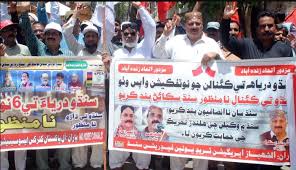Protests against the proposed canal project from the Indus River are spreading rapidly across Sindh. The demonstrations have disrupted road transport and judicial operations in several districts.
Lawyers declared that their sit-ins would continue until the government cancels the canal project formally. In Khairpur, the lawyers’ protest entered its ninth straight day at the Babarlou Bypass on the National Highway. In Ghotki, two protests are ongoing. Nationalist groups are staging a sit-in at the Mangrio Pump site near Daharki. Lawyers are blocking the Sindh-Punjab border near Kamo Shaheed.
Both protesting groups are firm. They demand an official notification confirming the cancellation of the canal project, despite Prime Minister Shehbaz Sharif’s assurance that no canal would be built without consensus.
PM Shehbaz and PPP Chairman Bilawal Bhutto Zardari met in Islamabad on Thursday amid mounting unrest across Sindh. In a joint press conference, PM Shehbaz announced that no canal project would move forward without an agreement in the Council of Common Interests (CCI). He said the next CCI meeting on May 2 would formally approve the understanding reached with the PPP leadership.
Meanwhile, the ongoing sit-ins, supported by civil society members, have completely blocked the transport of goods between Sindh and Punjab. The Sindh Bar Council also called for a province-wide strike. This led to massive disruption in legal proceedings across Hyderabad, Larkana, Nawabshah, Jacobabad, and other cities. Even the City Court remained locked on Friday. Hundreds of cases got adjourned without hearings, causing hardship for litigants.
The transport blockade due to protests against the canal project has affected other areas too. In Faisalabad, more than 1,000 containers linked to the textile industry are stuck because of the road closures. This halt has caused a serious shortage of raw materials and interrupted production at factories.
Faisalabad Chamber of Commerce officials revealed that two export vessels had already been missed because of the disruptions. Exports that were scheduled two weeks ago could not move forward.
Speaking to the media, the chamber’s president described the situation as critical. He urged Prime Minister Shehbaz Sharif, Army Chief General Asim Munir, and Sindh Chief Minister Murad Ali Shah to act swiftly.
He warned that ongoing problems linked to the canal project protests could cause lasting damage to Pakistan’s economy. He stressed the need for immediate efforts to restore transportation and judicial functions.
“We appreciate that the government wants to bring improvement,” he said. “But disruptions like these are damaging our exports.”
The protest against the controversial canal project continues to create new challenges every day, with widespread impacts felt across sectors.


